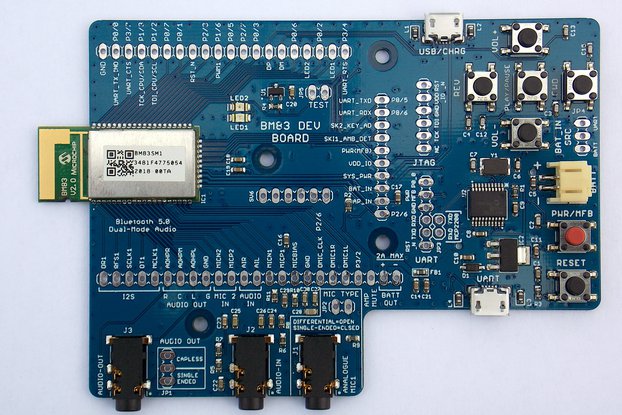Development board with an ARM Cortex-M4 MCU, high impedance stereo in, stereo out, USB, knob/button inputs, in a 50×50mm form factor
Designed by Elemental Instruments in Sweden
This product is no longer available for sale.
The seller may be offering an improved version or it may be hanging out on the beach, enjoying the retired life.
Note: This product has been retired because I was unhappy about the ADC performance. None were sold. This is an open source audio development board with an ARM Cortex-M4 MCU (STM32F405RG), an audio c…
Read More…Note: This product has been retired because I was unhappy about the ADC performance. None were sold.
This is an open source audio development board with an ARM Cortex-M4 MCU (STM32F405RG), an audio codec (WM8731) and a high impedance pre-amplifier. The microcontroller has DSP instructions and 192KiB of RAM and as such is quite capable of running audio effects such as delay, amplifier simulations, sound synthesis or whatever you can dream up. The board is intended for developing custom effects for things like electric guitars, and some example code is available on GitHub if you don't want to start from scratch.
I started working on this project because I struggled to find a nice development platform to explore the audio DSP capabilities of Cortex-M4 microcontrollers.
New firmware can be uploaded over USB using the firmware update (DFU) support in STM32's built-in bootloader, or through the debug connector. Personally I use the very affordable ST-Link/V2 with an Olimex ARM-JTAG-20-10 adapter for programming and debugging. The physical dimensions are 50×50 mm (44 mm hole spacing) so the board fits comfortably in the wiring compartment of an electric guitar, a wah-wah pedal, stomp box, etc.
More info can be found at Hackaday.io and GitHub.
The stereo audio input is pre-amplified to get a high input impedance suitable for connecting to an electric guitar or other passive instruments. An audio codec digitizes the signal and feeds it to the STM32 MCU, and converts the digital audio back to analog that is fed to the headphone output.
If the audio input is clipping because whatever you're feeding in is too high level (more than, say, 1V RMS), attenuate it a bit with a resistor divider first.
I have developed some "proof of concept" effects that can be used as example code to get started. In a nutshell, the firmware can do vibrato, variable delay, resonant lowpass, distortion (intentional or not) based on potentiometer inputs. USB support for logging and device-to-host audio is also implemented, but it has only been tested with a Linux host. The implementation is in modern C and is using libopencm3 and a GCC toolchain. The code is here: GitHub.
The board is designed to be deployed in an effects pedal or box or in the wiring compartment in an electric guitar. To avoid ground loops it is wise to run it from a battery or an isolated power supply (not mains earth referenced).
The acceptable input voltage is around 4 to 9 V and the current draw lands at about 80mA — that should give you about 24 hours runtime on 4 AA cells.
There is also a micro-USB connector on the board that can be used to provide power and talk to a computer. Note that the USB bus power is connected to the power input terminal, so avoid connecting another power supply (such as a battery) at the same time as USB. The USB power from a computer can be quite noisy, so it may be a bad idea to use it from an audio quality point of view. There is no inrush current limit on the USB power line, which strictly is in conflict with requirements in the USB standard.

$64.95
Free Shipping!

$65.00
Free Shipping!

$23.00
Free Shipping!

$11.00
Free Shipping!
By clicking Register, you confirm that you accept our Terms & Conditions
We recognize our top users by making them a Tindarian. Tindarians have access to secret & unreleased features.
We look for the most active & best members of the Tindie community, and invite them to join. There isn't a selection process or form to fill out. The only way to become a Tindarian is by being a nice & active member of the Tindie community!
